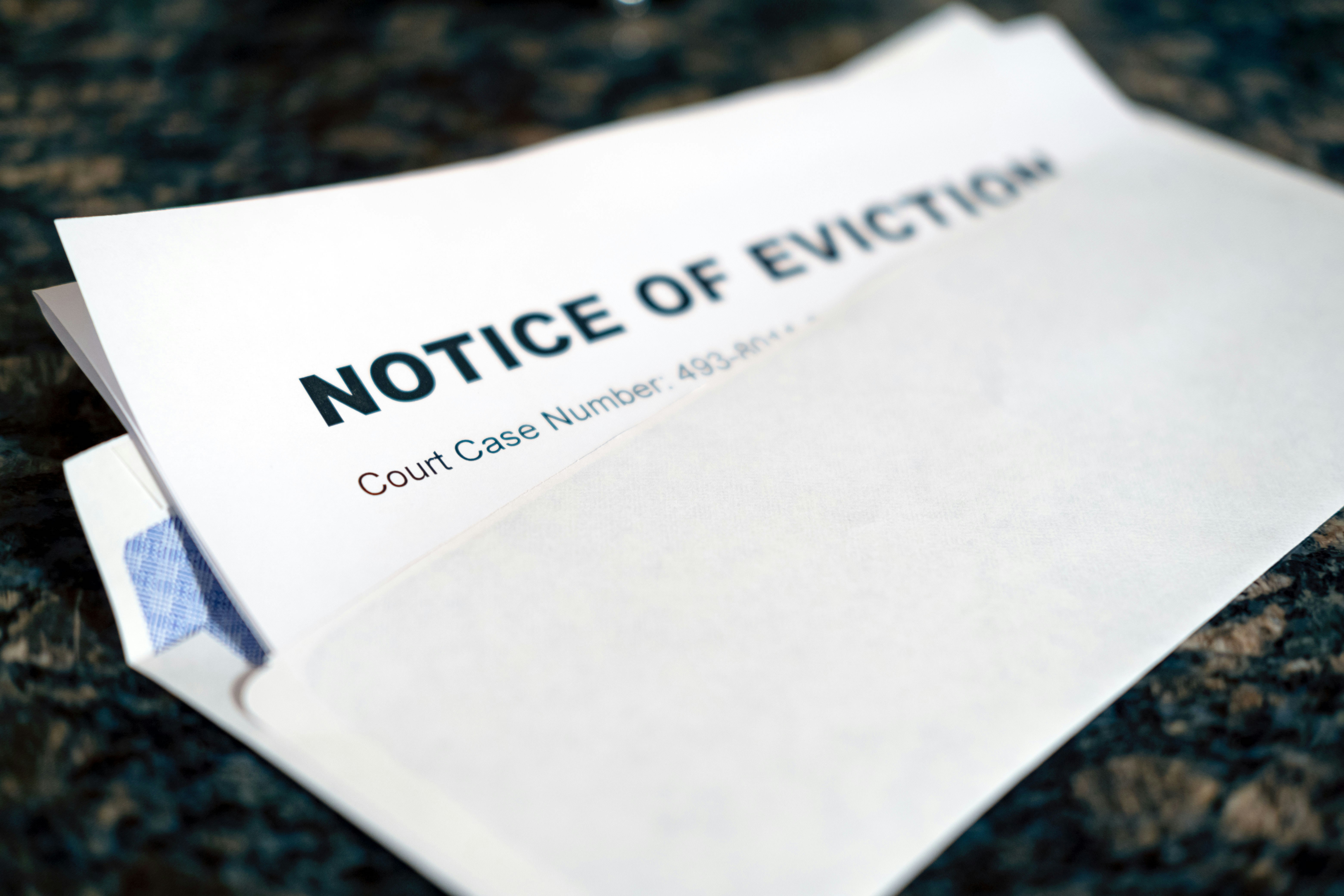Dealing with tenant evictions is one of the most stressful situations a landlord can face. Whether it's due to non-payment of rent, lease violations, or other issues, evictions disrupt the normal flow of your rental income and can create significant financial strain. However, understanding how Virginia’s eviction process works and knowing the steps you need to take can help minimize the impact on your property and your peace of mind.
Disclaimer: The content provided here is for general informational purposes only and does not constitute legal, financial, or tax advice. No client relationship is created by reading the blog. Always consult with a qualified attorney, accountant, or financial advisor to assess your specific situation.
In this post, we’ll break down the eviction process in Virginia, offer practical tips for landlords, and explain how PMI James River can support you during this challenging time.
The Eviction Process in Virginia: A Step-by-Step Overview
In Virginia, the eviction process is governed by specific laws under the Virginia Residential Landlord and Tenant Act (VRLTA) to protect the rights of both landlords and tenants. Following the proper legal steps is crucial to avoiding delays or legal disputes.
Here’s An Abbreviated Outline of the Process:
1. Is There a Valid Reason?
Before initiating the eviction process, Virginia landlords must ensure they have a valid legal reason to evict a tenant. Under Virginia law, acceptable grounds for eviction include non-payment of rent, violations of enforceable lease terms, holdover tenancies, and illegal activity. Evictions based on reasons outside these legal grounds—such as discrimination, retaliation, or personal disputes—are prohibited and could result in legal consequences for the landlord. Ensuring a valid reason is the foundation of a successful eviction case and helps avoid delays or challenges during the court process.
2. Give Notice
Before beginning the formal eviction process, you must provide the tenant with appropriate written notice. The type of notice depends on the situation:
- Pay or Quit Notice: Issue a 5-day notice if the tenant has failed to pay rent, giving them the opportunity to pay or vacate.
- Cure or Quit Notice: If the tenant violated the lease, issue a 21-day notice to fix the issue or leave.
- Unconditional Quit Notice: For severe or repeated lease violations, issue a 30-day notice requiring the tenant to vacate without the option to resolve the issue.
3. File an Unlawful Detainer Action
If the tenant doesn’t comply with the notice, the next step is filing an Unlawful Detainer action with the local General District Court. This is a formal request for the court to order the tenant to vacate the property. You’ll need to pay filing fees and provide evidence such as the lease agreement and proof of notice delivery.
4. Court Hearing
After the complaint is filed, a court hearing date is set. At the court hearing, both the landlord and tenant can present their arguments. If the judge rules in favor of the landlord, they will issue a Writ of Eviction, which authorizes the sheriff to remove the tenant if they don’t vacate voluntarily.
5. Enforcement of the Eviction
If the tenant does not leave voluntarily after the Writ of Eviction is issued, the sheriff will enforce the eviction, and the landlord can regain possession of the property.
What a Landlord Cannot Do During Evictions
Understanding what actions are prohibited during the eviction process is critical for landlords to stay compliant with Virginia law. In Virginia, as in most states, self-help evictions—when landlords take matters into their own hands without following the legal process—are illegal. Here are some common examples of illegal self-help eviction actions:
- Lockouts: Changing the locks or restricting a tenant’s access to the property without obtaining a court order is illegal. Even if a tenant has failed to pay rent or violated the lease agreement, landlords must adhere to the formal eviction process to legally regain possession of the property.
- Utility shutoffs: Turning off essential utilities like water, electricity, or gas to force a tenant to vacate the premises is prohibited. This action is a clear violation of tenant rights and can lead to legal consequences for the landlord.
- Removing tenant belongings: Landlords are not allowed to remove or dispose of a tenant’s personal belongings, such as furniture or other items, without following the proper legal procedures. Using tenant belongings as leverage for unpaid rent or as a substitute for rent owed constitutes a self-help eviction and violates tenant protections.
- Use harassment or intimidation: Engaging in harassment, threats, or intimidation to coerce a tenant into leaving is strictly prohibited. Examples of harassment include excessive or unannounced visits to the rental property, making threatening statements, or intentionally creating an uncomfortable or unsafe environment to pressure the tenant to vacate.
Self-help evictions bypass the legal safeguards that ensure the rights of both landlords and tenants are respected. Landlords who engage in any of these actions risk serious legal consequences, including fines, court fees, and even being required to pay damages to the tenant. To legally regain possession of a property, landlords must follow the formal eviction process as outlined in Virginia law. This process ensures that both parties’ rights are protected and helps avoid costly legal disputes.
Key Considerations During the Eviction Process
Legal Compliance
The eviction process in Virginia is strictly regulated, and it’s crucial to follow the correct procedures. Missing deadlines, failing to provide or improperly serving notices, or trying to evict a tenant without a court order can lead to delays and legal liability. Understanding the legal requirements and staying compliant is vital to successfully regaining possession of your property.
Costs and Time
Evictions can be expensive and time-consuming. Beyond the lost rent, landlords often face court fees, attorney costs, and the expense of property repairs and cleaning after a tenant leaves. The eviction process itself can take weeks, and in some cases, even months, particularly if the tenant contests the action or files for appeals. This extended timeline can create a significant gap in income, which is why timely and proactive management is essential.
Tenant Damage and Property Maintenance
In addition to the legal process, evictions often result in property damage or the need for repairs. Tenants who are behind on rent may not take care of the property, leaving you with maintenance issues when they move out. It’s important to factor in time and cost for cleaning, repairs, and sometimes even rebranding or redecorating the unit to attract a new tenant quickly.
Evolving Laws and Regulations
Landlord-tenant laws in Virginia are updated annually, often in July, and these changes can significantly impact the eviction process. Updates may include new tenant protections, adjustments to notice requirements, timelines for Unlawful Detainer actions, and stricter rules for delivering notices or handling security deposits. Staying informed about changes to the Virginia Residential Landlord and Tenant Act (VRLTA) and local ordinances is critical to remaining compliant and avoiding legal risks. Landlords should regularly review updates from the Virginia Department of Housing and Community Development and Virginia’s Fair Housing Office, consult legal professionals, or work with property management experts like PMI James River, who ensure clients stay compliant with evolving laws.
How to Avoid Eviction: Prevention Tips
While there are no major formulae that eliminate the risk of evictions, there are ways to reduce the risk of it happening in the first place:
- Screen Tenants Thoroughly: Conduct background checks, verify employment, and check references from previous landlords to ensure your tenants are responsible and reliable.
- Create Clear Lease Agreements: A well-drafted lease agreement with clear terms regarding rent, property maintenance, and other important factors can help prevent disputes down the road.
- Act Quickly When Issues Arise: If a tenant is behind on rent or violating the lease, address the situation immediately. The sooner you act, the more likely you are to resolve the issue without needing to resort to eviction.
- Communicate Effectively: Open lines of communication with your tenants can sometimes resolve issues before they escalate to eviction. Many tenants will appreciate a chance to work out payment arrangements or resolve other issues if approached professionally and promptly.
- Work with a Property Management Company: Partnering with a professional property manager like PMI James River can save you time and ensure smooth operations, even during difficult situations.
How PMI James River’s Landlord Rescue Program Can Help
Even with preventative measures in place, evictions are sometimes unavoidable. In fact, eviction rates in Virginia is remarkably high: 10% statewide and 16% in the Richmond area. If you find yourself facing a difficult tenant situation, PMI James River offers a Landlord Rescue Program to guide you through the eviction process and beyond. Our program:
- Partners with an experienced eviction law firm to streamline the entire process.
- Guides landlords through the legal eviction process.
- Ensures up-to-date compliance with federal, state, and local laws.
- Handles court filings, notices, and representation.
- Oversees property turnover, including repairs and cleaning, to minimize vacancy time.
- Assists with strategies for recovering unpaid rent.
Protecting Your Investment with Landlord Insurance
PMI James River has also partnered with SureVestor, a leading provider of landlord protection insurance, to give our clients peace of mind during challenging situations like evictions. SureVestor, who partners only with credible property managers that have a proven record of minimizing the risk of evictions, offers a range of benefits designed to safeguard landlords’ financial interests, including:
- Eviction Coverage: Up to $5,600 in reimbursements for legal and sheriff fees.
- Lost Rent Protection: Up to 25 weeks of lost rent coverage due to om tenant defaults.
- Malicious Damage Coverage: Up to $35,000 coverage against malicious damage caused by tenants.
- Theft Coverage: Up to $15,000 coverage for theft and theft-related damage.
- Lockbox Coverage: Up to $5,000 coverage for losses due to use of lockboxes.
- General Liability: Up to $1,000,000 coverage for third-party claims that happen on rental properties.
Take the Stress Out of Evictions with PMI James River
Evictions are a challenging aspect of property management, but you don’t have to handle them alone. Whether you’re struggling with a current tenant or looking to avoid future problems, PMI James River is here to help. Contact us today to learn more about our Landlord Rescue Program and our partnership with SureVestor can protect your rental property and income during difficult times.


